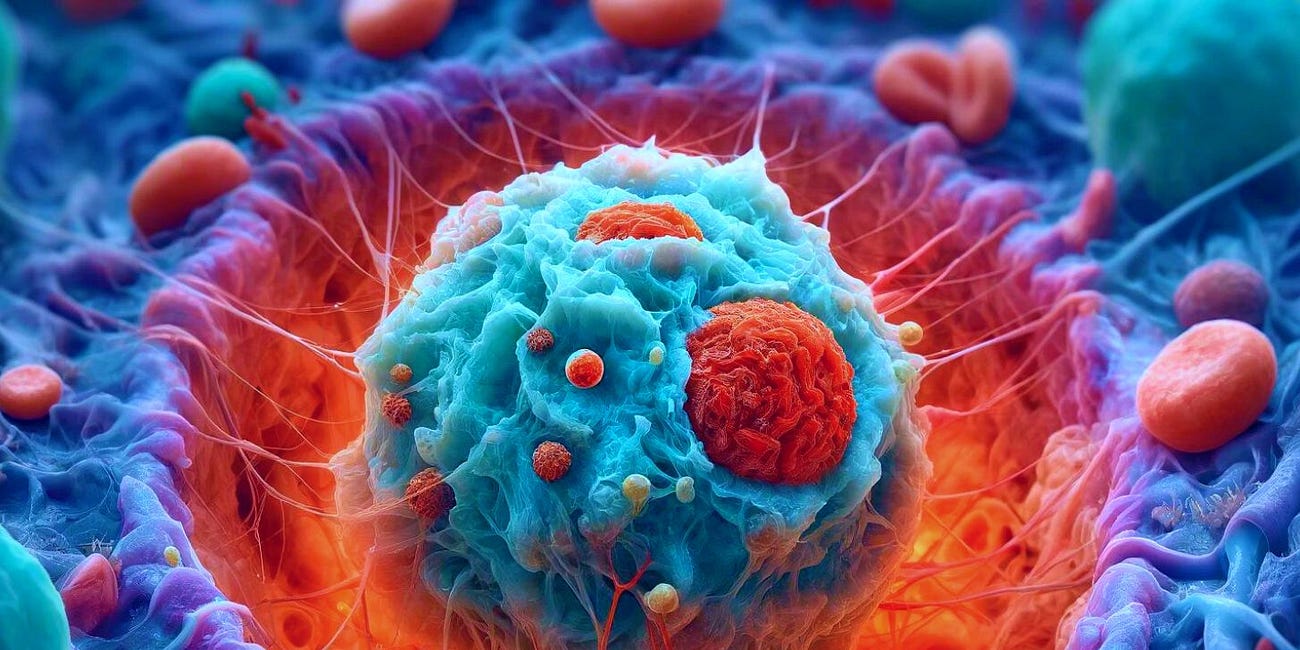COVID Spike Protein—Present in Pfizer, Moderna mRNA Jabs—Helps Cancer Cells Survive Chemotherapy: Brown University Study Preprint in 'BioRxiv'
Study author confirms findings "would also apply to vaccine-made spike."
Brown University researchers posted a preprint study last month in BioRxiv, an open-access preprint repository for the biological sciences, confirming that the SARS-CoV-2 spike protein interferes with the effectiveness of chemotherapy treatment for cancer.
Follow Jon Fleetwood on Instagram @realjonfleetwood / Twitter @JonMFleetwood
The spike protein, also produced in the body following COVID-19 mRNA injections, such as those from Pfizer Inc. and Moderna Inc., can worsen the condition of cancer patients.
In tests, cancer cells with the spike protein survived better after chemotherapy, according to the study.
This is because the spike protein interferes with a key protein in cancer cells called p53, which normally helps suppress tumors.
The study looked at patients using the chemotherapy drug ‘cisplatin,’ a cancer treatment medication used to treat various types of cancers, including testicular, ovarian, bladder, and lung cancer.
Cisplatin works by interfering with the DNA in cancer cells, preventing them from dividing and causing them to die.
The study reads:
Severe acute respiratory syndrome coronavirus 2 (SARS-CoV-2) and COVID-19 infection has led to worsened outcomes for patients with cancer. SARS-CoV-2 spike protein mediates host cell infection and cell-cell fusion that causes stabilization of tumor suppressor p53 protein.
…
We further observed that SARS-CoV-2 spike suppresses p53 transcriptional activity in cancer cells including after nutlin exposure of wild-type p53-, spike S2-expressing tumor cells and inhibits chemotherapy-induced p53 gene activation of p21(WAF1), TRAIL Death Receptor DR5 and MDM2. The suppressive effect of SARS-CoV-2 spike on p53-dependent gene activation provides a potential molecular mechanism by which SARS-CoV-2 infection may impact tumorigenesis, tumor progression and chemotherapy sensitivity.
Follow Jon Fleetwood on Instagram @realjonfleetwood / Twitter @JonMFleetwood
Certain tumor cells expressing spike protein “were found to have increased cell viability as compared to control cells.”
The authors argue their findings “warrant further studies to unravel the impact of SARS-CoV-2 and its various encoded proteins including spike on pathways of tumorigenesis and response to cancer therapeutics.”
While the study did not analyze the COVID shot directly, one of the authors, Dr. Wafik El-Deiry, told The Epoch Times the data imply that COVID countermeasures, like the COVID mRNA and protein vaccines, could similarly support cancer growth.
“Our goal was to study spike protein regardless of its origin,” said El-Deiry, director of the Cancer Center at Brown University. “We focused on spike that may come from infection or any other way it can be expressed in human cells,” which “would also apply to vaccine-made spike.”
You can download the full preprint here:
The study authors’ affiliations include:
Laboratory of Translational Oncology and Experimental Cancer Therapeutics, Warren Alpert Medical School, Brown University, Providence, Rhode Island
Department of Pathology and Laboratory Medicine, Warren Alpert Medical School, Brown University, Providence, Rhode Island
Joint Program in Cancer Biology, Lifespan Health System and Brown University, Providence, Rhode Island
Legorreta Cancer Center at Brown University, Providence, Rhode Island
Hematology/Oncology Division, Department of Medicine, Lifespan Health System and Brown University, Providence, Rhode Island
Follow Jon Fleetwood on Instagram @realjonfleetwood / Twitter @JonMFleetwood
mRNA COVID Jab Ingredient N1-Methyl-Pseudouridine (m1Ψ) 'Stimulated Cancer Growth and Metastasis': 'International Journal of Biological Macromolecules'
A new study published earlier this month in the International Journal of Biological Macromolecules confirms that an ingredient in mRNA COVID-19 injections called N1-methyl-pseudouridine (m1Ψ) increases cancer growth and spread.
Excess Cancer Deaths Spike from -1,379 in 2020 to +7,162 in 2022 'After Mass Vaccination' with mRNA COVID Jabs in Japan: Journal 'Cureus'
A brand new peer-reviewed study published in Cureus on Monday found significant increases in age-adjusted mortality rates of all cancer types in 2022 after the majority of the Japanese population received doses of the COVID-19 mRNA vaccine.
Repeat COVID-19 Vaccinations Linked to 'Multi-Hit' Cancer Growth Model: Peer-Reviewed Journal 'Cureus'
A study published last month in the peer-reviewed journal Cureus has linked COVID-19 vaccines to the “multi-hit hypothesis” of cancer growth in the body. The multi-hit hypothesis of cancer suggests that a series of mutational events, like booster vaccinations, are necessary for a cell to become malignant or cancerous.
Cancer Reappears in Patient Following COVID-19 Vaccination: Peer-Reviewed Journal 'Infection' Case Study
A new publication in the peer-reviewed medical journal Infection reported the reappearance of Kaposi’s sarcoma (KS), a type of cancer that develops from the cells that line lymph or blood vessels, in a 48-year-old male patient who recently received multiple COVID-19 vaccinations.
Roughly 1/3rd of mRNA COVID-19 Vaccine Recipients Experience 'Unintended Immune Response in the Body': Cambridge University, Journal 'Nature'
In a startling new study, researchers from the University of Cambridge’s Medical Research Council (MRC) Toxicology Unit have uncovered a significant unintended immune response triggered by mRNA COVID-19 vaccines in approximately one-third (25-30%) of recipients.







